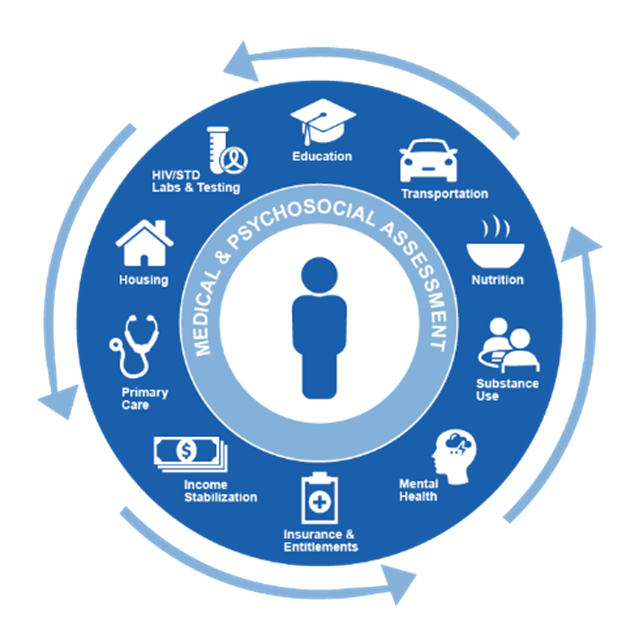A Person-Centered Approach to Status Neutral HIV Prevention and Care Services
By Reilly O'Neal | June 25, 2024
Contractor, ETR
Status neutral HIV prevention and care is a “whole person” approach that links people with services to meet their needs, whatever their HIV status may be.
This holistic approach to care recognizes clients have multiple—sometimes competing—medical and psychosocial needs, which can pose a barrier to accessing HIV prevention and care. By offering HIV services as part of a wide range of healthcare and support services, a status neutral approach connects clients to the resources they want and need, helps normalize HIV prevention and care, and addresses social determinants of health—including HIV stigma—that contribute to health disparities in HIV.
How can health agencies and organizations take a person-centered approach and put status neutral prevention and care into practice? Read on below where we highlight some key elements of this approach and how to get started using them in your own work!
Elements of Person-Centered Status Neutral HIV Service Provision
The specific resources and services available to your clients will vary, but a person-centered, comprehensive, status neutral system includes a few important elements.
-
Provide a comprehensive client needs assessment: Going beyond sexual and substance use history, a comprehensive assessment of a client’s experience and circumstances seeks to identify what medical and psychosocial support the client might want or need to meet their own health and well-being goals. These could include clinical services like routine vaccinations, gender-affirming care, and dentistry, or non-clinical services like housing assistance, transportation, and legal aid. Adapt the comprehensive needs assessment according to the services and resources your site offers and those available from partner organizations, local providers, and regional and national programs.
-
Navigation, including referral and linkage to services: Navigation is the overarching system of connecting a client to resources and services, which includes referral and linkage to services.
-
Active referral: Unlike a passive referral, where a client receives information and is expected to learn more and make their own appointment, providing an active referral means helping your client make an appointment for the services they want. For example, this might involve guiding your client down the hall for an on-site HIV test or helping them make an appointment with a local mental health care provider.
-
Linkage to services: Linkage is the successful completion of a referral and involves following up to confirm and document that the client connected with the referred service. You can follow up with clients however they prefer, by phone, through a secure care management app or service like MyChart, or at a scheduled in-person visit.
-
Reassessment: A person-centered approach to services is an ongoing process that recognizes peoples’ needs change. Scheduled follow-up conversations are an opportunity to identify gaps in services, address any barriers to accessing referred services or support, and consider any additional resources that fit your client’s evolving circumstances, needs, and priorities.
Tips for Taking a Person-Centered Comprehensive Needs Assessment
Working with clients in a status neutral system starts with understanding the individual’s unique experience and needs. Below are a handful of techniques you can use to make sure you’re centering your client in a comprehensive needs assessment!
-
Address bias. Person-centered service providers are affirming and strive to ensure that all clients—whatever their HIV status, race, ethnicity, age, ability, body size,
 sexuality, gender identity, and gender expression may be — receive the same quality of care and access to services. A crucial first step in providing this level of care is acknowledging and addressing bias, including our own implicit bias, that can contribute to inequitable treatment in care settings.
sexuality, gender identity, and gender expression may be — receive the same quality of care and access to services. A crucial first step in providing this level of care is acknowledging and addressing bias, including our own implicit bias, that can contribute to inequitable treatment in care settings. -
Welcome your client warmly and build trust. Before you begin the assessment, introduce yourself, your pronouns, and share your role in the client’s care. Be sure to also confirm your client’s name and pronouns. Explain that you would like to ask some questions so you can help them get what they need to be as heathy as possible. Let the client know that your questions might feel personal, and they can choose to skip questions or postpone the assessment for another time.
-
Use active listening. Giving the client your full attention, holding your questions, and reflecting on what they’ve shared shows respect for their experience and lets the client know you’re taking in what they are sharing with you.
-
Use a conversational tone. An informal way of speaking that avoids acronyms, medical or technical terms, and other words you wouldn’t use in everyday life is helpful to establish a person-centered approach to care. Using a conversational tone may help put clients at ease if they are feeling intimidated in a healthcare or social services setting or uncomfortable answering personal questions.
-
Practice cultural humility. Cultural humility is an ongoing process around developing awareness of how people’s culture and lived experience can influence their health behaviors, and then using that awareness to inform respectful communication and collaboration with clients.
Incorporating these techniques can help ensure each client’s individual experience, preferences, and goals put the “person” in the person-centered status neutral HIV prevention and care.
Want to Learn More?
Explore this issue brief on Status Neutral HIV Care and Service Delivery published by the CDC.
Review this introductory blog post on Creating Status Neutral HIV Prevention and Care by one of our ETR staff.
Take the Person-Centered Approach to Comprehensive Services Through Status Neutral Client Assessment, Navigation, and Referral course developed by ETR’s Project Evolve team for free on CDC TRAIN in English!
How to access the course:
New to CDC TRAIN?
1. Create a CDC TRAIN account.
2. Join the HIVCBA Learning Group.
3. Launch the course.
Already on CDC TRAIN?
1. Launch the course.
Reilly O’Neal (she/her) is a contractor with ETR, helping write and update courses on HIV prevention and care. She has developed trainings and other content for PleasePrEPMe, HealthHIV, and the University of California at San Francisco and is a former editor of BETA at San Francisco AIDS Foundation. Reilly has worked in HIV and sexual health since 2006.




